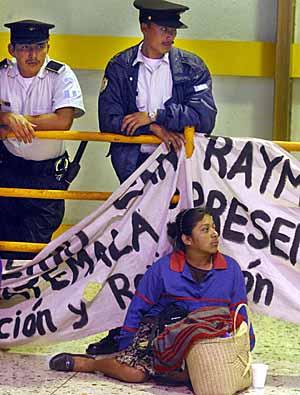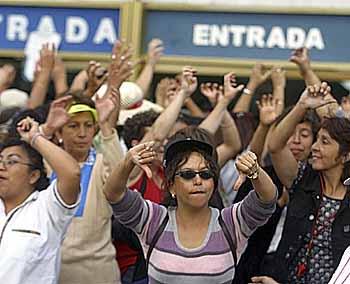| Wed, February 26, 2003 |  |
|||||||
|
Teachers disrupt ports in Guatemala
GUATEMALA CITY - Striking teachers disrupted international air travel and access to the seaports Tuesday as part of a growing conflict with the government over demands for a salary increase and improvements to the school system. The strike has remained peaceful so far, but the potential for violence grows as national police respond to increasing civil disobedience involving the occupation of public buildings, traffic blockades and other disruptions. Tension heightened this week when hundreds of marchers overran the Santa Elena Airport in the northern province of Petén, forcing its closure. Strikers also blocked entries to two of the country's three principal seaports, Quetzal on the Pacific and Santo Tomás de Castilla on the Atlantic. At dawn Tuesday, the strikers targeted La Aurora International Airport in the capital city. Many flights were delayed and some were canceled. The strikers were kept out of the terminal by dozens of police in full riot gear, but the standoff continued through the evening. At least 60,000 of the country's 80,000 public school teachers have joined the national strike since it began Jan. 20. Negotiations have remained at a stalemate. Educators are seeking an increase in the education budget from approximately $422 million to $782 million. The extra funds would help pay for much-needed resources and permit a near doubling of salaries that now range from about $190 to $390 per month. Teachers also want the government to improve school buildings, supply more textbooks and provide better school lunches. |
||||||||
| Posted on Fri, Feb. 28, 2003 | |||
|
Guatemalan teachers give up airports, but vow to keep protesting
GUATEMALA CITY - (AP) -- Striking Guatemalan teachers withdrew Thursday from airports, ports and oil pumping stations they occupied this week, saying they would continue to negotiate wage contracts with the government. However, the work stoppage and the protests will continue elsewhere, said teachers union leader Joviel Acevedo. The teachers left La Aurora International Airport in the Guatemalan capital late Wednesday, just before a court order authorized police to evict them. They had occupied the terminal for 48 hours. The teachers also vacated the airport at Santa Elena in northern Petén department and the seaports of Quetzal on the Pacific and Santo Tomás de Castilla on the Atlantic. And they left an oil pumping station operated by the French company Perenco. Thousands of teachers are marching to the capital from the northwestern city of Huehetenango and are expected to arrive today. The teachers went on strike Jan. 20, the start of the school year. They are demanding an increase in the education budget to $782 million. Congress approved only $422 million for this year. The only offer from the government so far has been a $12 monthly bonus, which the teachers union has rejected. Archbishop Rodolfo Quezada Toruño continues to mediate the negotiations. |
|||
| Thu, February 27, 2003 |
 |
|||||||
|
Guatemalan strikers using civil defiance
To pry open government's purse, teachers close down travel, oil line.
GUATEMALA CITY - A national teachers strike launched to demand a pay raise and other improvements to the school system has escalated into a civil disobedience movement that has paralyzed traffic by land and air and opened the door to outbreaks of violence. On Wednesday, all U.S. flights, including American Airlines' three daily flights to and from Miami, were canceled indefinitely as the strike intensified and talks remained stalemated. Entrances to seaports also remained blocked, preventing shipments from entering or leaving. Also Wednesday, hundreds of teachers seized a pumping station on Guatemala's only oil pipeline, paralyzing operations. The French-owned pipeline north of Guatemala City carries about 25,000 barrels of crude oil a day. Support for the strike grew by the thousands across the country, and some 3,000 teachers were expected to arrive in the capital city today, following a three-day march from Huehuetenango in the northwest region of the country. For more than a month, academics have faced off with police as teachers have occupied government offices, blocked major highways and border crossings and created human barricades at the entrances of seaports and airports, including the capital's La Aurora International Airport. At least 60,000 of the country's 80,000 public school teachers have joined the strike -- the first of this magnitude in more than a decade -- since it began Jan. 20. While the turmoil has created havoc on the streets, its impact is most apparent in the classrooms devoid of some three million schoolchildren. ''Who is respecting the rights of the children to learn?'' said Edwin Pos, 34, who fears his four children will now be forced to repeat their grade level. ``How will they make up for lost time? This is a big problem. The teachers need to go back to work and the children need to study.'' Instead of doing homework, Pos' daughter, Sonia, spends the day doing chores at the school where Pos works as a guard and janitor. ''I don't like this at all,'' said the 11-year-old. ``I get bored and I really miss my friends.'' The strike reached its peak this week when hundreds of marchers overran the Santa Elena Airport in the northern province of Petén, forcing it to close. Strikers also blocked entries to two of the country's three principal seaports, Quetzal on the Pacific and Santo Tomás de Castilla on the Atlantic. AIRPORT TARGETED At dawn Tuesday, the strikers targeted La Aurora International Airport in the capital city. Many flights were delayed and some were canceled. The strikers were kept out of the terminal by dozens of police in riot gear. By day's end, the protest at the airport had swollen as supporters streamed in by the thousands. Many pitched makeshift tents and vowed to remain until the government fulfilled their demands. Negotiations have remained at a stalemate since talks began Feb. 4, despite mediation from the country's Roman Catholic archbishop. The strike, which teachers refer to as an ''assembly,'' was launched to seek an increase in the education budget from approximately $422 million to $782 million. The extra funds would help pay for much-needed resources and permit a near doubling of salaries that now range from about $190 to $390 per month. Educators also seek better school buildings, more books, adequate meals for students and other educational tools that could help reduce the illiteracy rate. Guatemala's social indicators, such as infant mortality and illiteracy, are among the worst in the hemisphere. Approximately 80 percent of the population lives in poverty, and about two-thirds of that number in extreme poverty. Nearly half of the population can't read or write. CHILDREN'S WELFARE ''What we are fighting for is the future of millions of children, who deserve a good education,'' said Susan Bautista, a teacher for 20 years. ``The truth is, the government doesn't want to educate its youth because they want to be able to dominate them for life.'' The deficiencies are evident in an elementary school in a neighborhood known as ''El Gallito.'' It operates in a house where bedrooms -- some no larger than walk-in closets -- have been converted into classrooms for at least 30 children. The school has been forced to move three times in four years because the government failed to pay the rent, said Ana Rosario Contreras, the director. At another elementary nearby, classrooms are often dark because of power outages caused by unpaid bills. Rain leaks through broken windows and cracks on the tin roof. Rats dash across hallways. Children spend recess playing next to a pile of discarded chairs, desks and other garbage that has not been hauled away. ''What we are asking for is just; Guatemala deserves a dignified school system,'' said Irvin Muscoso, a teacher for 28 years who was among those blocking the entrance at the international airport. Federal negotiators have offered a monthly bonus of $12 to supplement educators' incomes, saying funds are too limited for a bigger increase. The government also has lashed out against the civil disobedience acts, calling them illegal obstructions and warning of repercussions. ''The government will not tolerate any more illegal actions like the ones that have been occurring with the takeover of public buildings, blockades of streets, customs, ports and the obstruction of public services that affect the normal function of the economy and fundamental rights of the rest of Guatemalans,'' said a notice published by the National Palace and repeated in television public service announcements. |
||||||||

